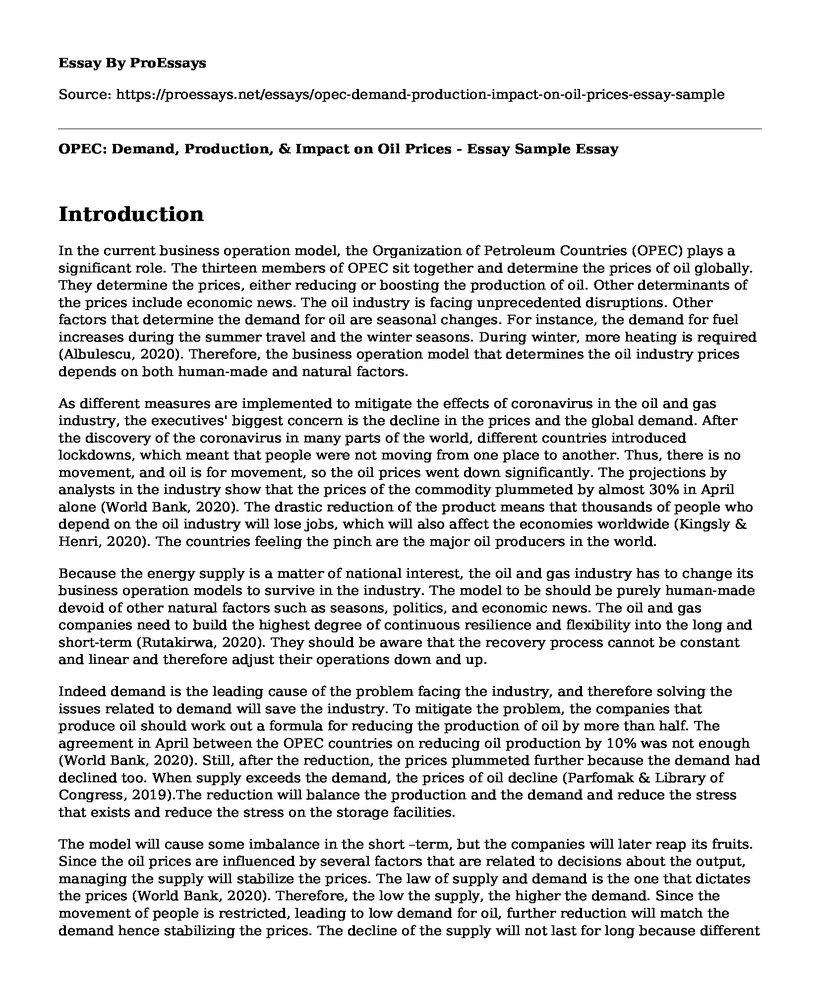Introduction
In the current business operation model, the Organization of Petroleum Countries (OPEC) plays a significant role. The thirteen members of OPEC sit together and determine the prices of oil globally. They determine the prices, either reducing or boosting the production of oil. Other determinants of the prices include economic news. The oil industry is facing unprecedented disruptions. Other factors that determine the demand for oil are seasonal changes. For instance, the demand for fuel increases during the summer travel and the winter seasons. During winter, more heating is required (Albulescu, 2020). Therefore, the business operation model that determines the oil industry prices depends on both human-made and natural factors.
As different measures are implemented to mitigate the effects of coronavirus in the oil and gas industry, the executives' biggest concern is the decline in the prices and the global demand. After the discovery of the coronavirus in many parts of the world, different countries introduced lockdowns, which meant that people were not moving from one place to another. Thus, there is no movement, and oil is for movement, so the oil prices went down significantly. The projections by analysts in the industry show that the prices of the commodity plummeted by almost 30% in April alone (World Bank, 2020). The drastic reduction of the product means that thousands of people who depend on the oil industry will lose jobs, which will also affect the economies worldwide (Kingsly & Henri, 2020). The countries feeling the pinch are the major oil producers in the world.
Because the energy supply is a matter of national interest, the oil and gas industry has to change its business operation models to survive in the industry. The model to be should be purely human-made devoid of other natural factors such as seasons, politics, and economic news. The oil and gas companies need to build the highest degree of continuous resilience and flexibility into the long and short-term (Rutakirwa, 2020). They should be aware that the recovery process cannot be constant and linear and therefore adjust their operations down and up.
Indeed demand is the leading cause of the problem facing the industry, and therefore solving the issues related to demand will save the industry. To mitigate the problem, the companies that produce oil should work out a formula for reducing the production of oil by more than half. The agreement in April between the OPEC countries on reducing oil production by 10% was not enough (World Bank, 2020). Still, after the reduction, the prices plummeted further because the demand had declined too. When supply exceeds the demand, the prices of oil decline (Parfomak & Library of Congress, 2019).The reduction will balance the production and the demand and reduce the stress that exists and reduce the stress on the storage facilities.
The model will cause some imbalance in the short –term, but the companies will later reap its fruits. Since the oil prices are influenced by several factors that are related to decisions about the output, managing the supply will stabilize the prices. The law of supply and demand is the one that dictates the prices (World Bank, 2020). Therefore, the low the supply, the higher the demand. Since the movement of people is restricted, leading to low demand for oil, further reduction will match the demand hence stabilizing the prices. The decline of the supply will not last for long because different countries have begun relaxing their restrictions on movement. Although reducing the supply will affect the industry through reduced profits and job losses, the benefits are also impressive (Walach, 2020). Though the model is sound and workable, the sector should also be supported by their respective governments financially.
References
Albulescu, C. (2020). Coronavirus and oil price crash. SSRN Electronic Journal. https://doi.org/10.2139/ssrn.3553452
Kingsly, K., & Henri, K. (2020). COVID-19 and oil prices. SSRN Electronic Journal. https://doi.org/10.2139/ssrn.3555880
Walach, H. (2020). Brain masks – How the covid19-crisis generates new narratives. SSRN Electronic Journal. https://doi.org/10.2139/ssrn.3608584
Parfomak, P. W., & Library of Congress. (2019). COVID-19: Response to the oil and gas pipeline sector. CRS reports (Library of Congress. Washington, D.C: Congressional Research Service.
Rutakirwa, T. O. N. N. Y. (2020). Understanding Corona Virus (Covid-19). Place of Publication Not Identified: Lulu Com.
World Bank. (2020). The economy in the time of COVID-19. World Bank Publications.
Cite this page
OPEC: Demand, Production, & Impact on Oil Prices - Essay Sample. (2023, Aug 17). Retrieved from https://proessays.net/essays/opec-demand-production-impact-on-oil-prices-essay-sample
If you are the original author of this essay and no longer wish to have it published on the ProEssays website, please click below to request its removal:
- Economics Essay Example: Oil Prices of the Primary Benchmarks
- Engine Work With Pressure Essay
- Application of Piezoelectricity Essay
- Engineering Communication Paper Example
- Essay Sample on Health Impacts of Hydraulic Fracking
- Essay Sample on Saudi Aramco Company
- Living in Favelas: A Reflection of Inadequate Infrastructure - Essay Sample







